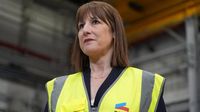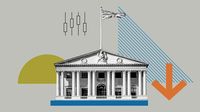UK inflation fell by more than expected in February 2025, driven largely by a significant drop in clothing and shoe prices, according to data released by the Office for National Statistics (ONS). The consumer price index (CPI) decreased to 2.8%, down from 3.0% in January, marking a notable shift in the inflation landscape as the UK economy grapples with various financial pressures.
The decline in inflation comes ahead of Chancellor Rachel Reeves' Spring Statement, where she is expected to outline her economic plans and address the challenges facing the nation. Grant Fitzner, the chief economist at the ONS, highlighted that women’s clothing was the primary driver behind this month’s fall in inflation. He noted, "This was only partially offset by small increases, for example, from alcoholic drinks." Overall, prices for clothing and footwear fell for the first time since 2021, with children's clothing also contributing to the decrease.
Despite the unexpected drop, the inflation rate remains above the Bank of England's target of 2%. Economists had predicted a more modest decline to 2.9%, reflecting concerns about ongoing economic stagnation and rising costs in other sectors. Core inflation, which excludes volatile items such as energy and food, rose by 3.5% in February, down from 3.7% in January.
The ONS reported that the largest downward contributions to inflation came from clothing and footwear, housing and household services, and recreation and culture. This is particularly significant as it reflects broader trends in consumer behavior and spending. The data release comes at a time when businesses are bracing for increased costs due to upcoming tax hikes and rising living expenses.
As the government prepares for rising council tax and energy bills in April, concerns about 'stagflation'—a situation where inflation rises while economic growth stagnates—are becoming more pronounced. Lindsay James from Quilter warned that while economic growth remains minuscule, persistent inflation could complicate the Bank of England's monetary policy decisions. James stated, "Economic growth is miniscule and risks going backwards, but should inflation continue to refuse to get back near the 2% target, it is difficult to see what the Bank of England can do with interest rates."
Chancellor Rachel Reeves is expected to address Parliament later today, March 26, 2025, at around 12:30 p.m. London time, where she will announce further cuts to welfare spending and potentially downgrade official economic growth predictions. The Liberal Democrats have criticized the current government, stating that the inflation figure offers little comfort to struggling families across the UK.
In light of the recent inflation data, Chief Secretary to the Treasury Darren Jones emphasized the government's commitment to "kickstarting growth" and pledged to take decisive action to improve economic conditions for working families. He remarked, "Our number one mission is kickstarting growth to raise living standards for working people." Meanwhile, Shadow Chancellor Mel Stride pointed out that the previous Conservative government left office with inflation at target, urging Reeves to take immediate action to prevent further financial strain on households.
Looking ahead, analysts remain cautious about the inflation outlook. Paul Dales, chief UK economist at Capital Economics, suggested that while the CPI might dip to around 2.5% in March, this would be temporary. He warned that rising energy costs and other expenses could push inflation back above 3% by April and potentially reach 3.5% by September. Dales explained, "The dip in CPI inflation from 3.0% in January to 2.8% in February is a bit of a red herring as inflation will probably be back above 3% in April and around 3.5% by September."
The Bank of England has maintained its interest rates at 4.5% amid these fluctuations, with market expectations suggesting a 77% chance of a rate cut at the upcoming May meeting. However, the ongoing uncertainty regarding inflation and economic growth means that significant caution is warranted. As the Bank navigates these challenges, the potential for further rate adjustments remains a hot topic among investors and economists alike.
Overall, the recent inflation data indicates a complex interplay between consumer behavior and broader economic indicators. With the government poised to announce significant fiscal measures, the coming weeks will be crucial in determining the trajectory of the UK economy. As households brace for rising costs, the impact of inflation on everyday life continues to be a pressing concern for many.







